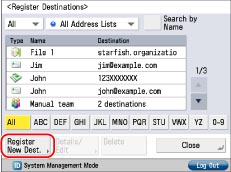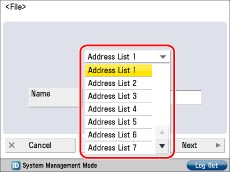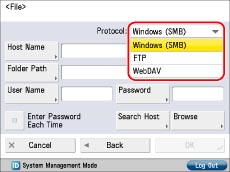File Server Addresses
1.
Press  .
.
 .
. 2.
Press [Set Destination] → [Register Destinations] → [Register New Dest.].

3.
Press [File].
4.
Press the drop-down list → select an address list from Address List 1 to 10.

Address lists are a convenient way to classify destinations.
The file server address that you enter will be stored in the address list that you select here.
5.
Press [Name].
6.
Enter a name for the destination → press [OK].
|
NOTE
|
|
For more information, see "Overview of This Function."
|
7.
Press [Next].
8.
Press the drop-down list → select the protocol.

|
NOTE
|
|
For more information on the available protocols, see "Specifying a File Server Using the Keyboard."
|
9.
Press [Host Name].
10.
Enter the host name → press [OK].
11.
Press [Folder Path].
12.
Enter the path to the folder → press [OK].
13.
Press [User Name].
14.
Enter the user name → press [OK].
15.
Press [Password].
16.
Enter the password → press [OK].
If you set [Enter Password Each Time] to 'On', a screen to enter the registered password appears when sending to a file server.
If you want to register a file server in a group address, set [Enter Password Each time] to 'Off'. You cannot send to a group address including a file server in which [Enter Password Each time] is set to 'On'.
|
NOTE
|
|
For instructions on specifying each of the settings for FTP, Windows (SMB), and WebDAV, see "Specifying a File Server Using the Keyboard."
|
17.
Press [OK] → [Close].
If you are performing Access Number Management for the Address Book, perform the following operation.
Press [Next] → [Access No.] → [Access No.].
Enter the access number using  -
-  (numeric keys) → press [Confirm].
(numeric keys) → press [Confirm].
 -
-  (numeric keys) → press [Confirm].
(numeric keys) → press [Confirm].Enter the access number again for confirmation → press [OK] → [OK].
|
IMPORTANT
|
|
If you set [Language/Keyboard Switch On/Off] to 'On' in [Preferences] (Settings/Registration), the host name and folder path of the file server destination may not be displayed correctly, and you may not be able to browse to them.
|
|
NOTE
|
|
For information on the settings for searching and browsing file server hosts, see "Setting Up a Computer as a File Server" for the SMB/CIFS network and "Setting Up a Computer as a File Server" for the TCP/IP network.
UPN can be used only if you are sending to a computer belonging to a domain operated with Active Directory.
|